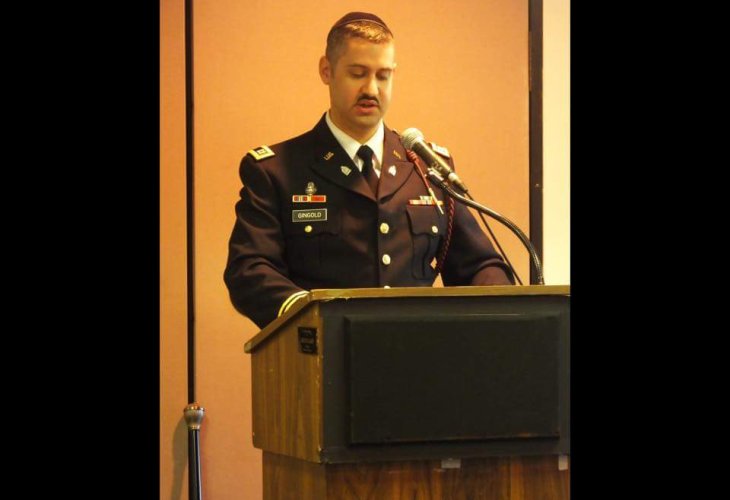Personal Stories
Serving Hashem with a Shaved Beard in the U.S. Army
A young rabbi, with guidance from Chacham Ovadia Yosef, takes Judaism to the most remote corners of the American military.

David Gingold Elsheikh always dreamed of serving in a meaningful way and helping Jews no matter where they might be. He never imagined that Hashem would send him to one of the most remote and unexpected places as a Jewish chaplain in the American military. But that’s exactly where his journey led, and with the constant support of his wife Nili, every challenge became more manageable.
So what does it mean to be a Jewish chaplain in the U.S. Army? “It’s completely different from the role of a military rabbi in Israel,” explains David, age 30, married and a father of two daughters. “In Israel, the focus is more halachic (Jewish legal), but in the U.S., the chaplain is a full soldier. He goes through boot camp like everyone else.”
With only about ten Jewish chaplains serving more than 10,000 Jewish soldiers across the U.S. military, each one carries a lot of responsibility. The role includes three main parts: helping soldiers with emotional struggles like trauma and stress, advising on ethical decisions through a Jewish lens, and learning intelligence work to help guide operations. The chaplain also acts as a social worker, counselor, and spiritual guide.
Because there are no kosher kitchens in the American military, kosher food is provided through special MREs (Meals Ready to Eat) for Jewish soldiers. “It’s our job to make sure kosher meals are available just like any other food for the other soldiers,” says David.
To become a chaplain, one must complete a master’s degree, go through 16 weeks of tough boot camp and officer training, and pass several workshops on mental health support. David says the boot camp, while intense, has a clear purpose. “When you train like your soldiers, you understand them better. You’re not giving advice from afar, you’ve lived through the same experiences. That builds real trust.”
Before joining the military, David taught halacha (Jewish law) in a kollel in Tel Aviv. After his wedding, he and Nili even went on shlichut (a Jewish outreach mission) to Japan, where David served as a rabbi. But nothing prepared them for what they’d face in his new role.
One year, the military gave him a building to use for the Passover Seder, but the week before, a pipe burst, and the entire space was flooded. “I went to my commander and explained the situation. His response was: ‘Either use the flooded building or move your Seder to the fire station garage.’”
They chose the garage.
Together, David and Nili took on the challenge. They kashered the garage, made it kosher for Pesach, and with help from Chabad, received Haggadahs and Seder plates. David had already arranged kosher-for-Pesach MREs and wine in advance, though the wine was a challenge. “Try explaining to a military commander why each soldier needs to drink four cups of wine. It’s not simple,” he recalls. “They want equal portions for everyone. Why should Jewish soldiers get more?”
David even gave up some MREs to make the Seder more meaningful. “I thought it was enough that they’re far from home. Why should they have to eat cold rations on Pesach?”
With Nili’s help, they boiled a massive 16-liter pot and made 100 matzah balls. But David knew that food wasn’t enough, it had to feel like Yom Tov. “We bought white tablecloths, napkins, plates, flowers, balloons, whatever we could. We weren’t allowed to light candles, so we used electric lights. To this day, people say it was the most beautiful fire station they’ve ever seen.”
At the Seder, 50 soldiers from all backgrounds participated. Each one helped read from the Haggadah, and many shared how they celebrate Pesach back home. “We weren’t trying to make anyone religious,” David explains. “We just wanted them to feel connected, to feel part of something.”
This warm and inclusive approach opened hearts. “There’s something about showing people that you care,” says David. “Once that connection is made, the rest comes naturally.”
One soldier’s story moved him deeply. A female Jewish medic became more observant during her service, keeping Shabbat, eating kosher, celebrating holidays. She was sent to Iraq for Pesach, and no chaplain could reach her base. Determined, she wrote to rabbis in the U.S. asking for the full Seder text and prepared to lead it herself. “She was the only one who spoke Hebrew and the most religious there. So she took charge. We helped her as best we could, using whatever was available.”
David explains, “Military chaplaincy is a role of ‘after the fact.’ Not everything is perfect or follows the book. That’s when you rely on the unwritten ‘fifth section’ of the Shulchan Aruch, which is about using good judgment.”
Some challenges were especially tough. “The hardest moment was when I had to decide whether I could attend a eulogy for a non-Jewish soldier. According to halacha, this can be permitted for the sake of peace, but it’s not simple.”
But the biggest inner struggle came at the very beginning: shaving his beard. “I had never shaved in my life, and in the American military, growing a beard is nearly impossible. I turned to a dayan (halachic judge) in Holon, who was close to Rabbi Avraham Yosef, son of Chacham Ovadia Yosef. I promised to do whatever Chacham Ovadia said.”
And what did the great rabbi rule?
“He gave me his blessing. He said it was a mission, and for that it was allowed.”
This one blessing gave David the strength to enter a world completely different from his own, bringing Judaism, Torah, and warmth to places where it was needed most.

